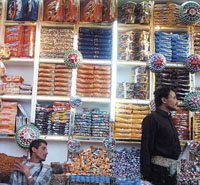
High cost of living crushes the poor [Archives:2007/1072/Reportage]
July 30 2007
 |
High food prices in Yemeni marketplaces have had the most detrimental effect on the country's poor. Prices have been increasing daily since the end of presidential elections last September, despite claims of the Yemeni government ensuring protection against price inflation.
Officials in charge of implementing pricing regulations confessed that the process of fixing prices is a difficult matter. Recently, the Minister of Trade and Industry, along with the Minister of Agriculture, released a statement that the two ministries are diligently striving to find a solution to this real dilemma.
During a field investigation undertaken by Yemen Times reporters, the following price inflations were recorded within a weeks time: Wheat rose from YR 3700 to YR 4200, flour rose from YR 3500 to YR 4500, sugar rose from YR 3800 to YR 4400, 3.5 liters of oil was YR 650 and now 2.5 liters is YR 900 and Al-Qamariyya ghee rose from YR 270 to YR 370.
Most high-priced goods are locally produced, contrary to a statement made by the prime minister who said that imported products are becoming costlier because of global increase in prices.
The price of other important foodstuff like rice is also hiking: a kilo of Thai rice is presently YR 150 whereas a kilo of Indian or Pakistani rice is YR 300. Before, a kilo of good quality rice was YR 200. Non-food items also are experiencing price inflation, including cement, which increased to YR 2000 for 50 kilos.
Yemeni citizens of many governorates expressed their mortification and fury at the price hikes and high cost of living. A large number of locals revealed that they can barely stay alive, including one man who stated, “Today we see the foodstuffs have reached the highest price with an increase of 50 percent.” He also demanded the governorate as well as food suppliers not to increase product prices, especially those highly consumed. “The baby milk and the beans can cost as much as 1350 and 150 riyals respectively. Salaries can meet neither the tariff of electricity nor the bill of water,” he asserted.
Ahmed Suliman, a vegetables vender, said, “The prices have been increased highly to the extent that simple citizens barely keep themselves alive. They cannot afford such prices. Now, they buy from retailers.” He also indicated that vegetables suppliers are being sold goods at higher prices, forcing them to resell their products at inflated prices.
Jabri Hamoud, a government employee stated, “My salary is YR 34500, which is not enough to live up with. Yesterday, I paid YR 8000 for the bill of the electricity. If my salary is doubled, it will not meet the electricity consumption. In Aden, we operate air conditioners as it is a must. The electricity corporation does not take into consideration the increasing prices of foodstuff or the hot weather of the city particularly in the summer season.”
Saleem Ahmed, another citizen suffering from price hikes, shared, “I think that the image of these cottages and houses made of hay in Aden city along with poverty and unemployment is a reflection of price hikes. Aden is one of the top cities living under the line of poverty.” He went on to say that he has been living in his cottage since the Gulf war without proper infrastructure such as water, electricity, or sanitation. “When we try to have the simplest of our rights, the government says it is a randomly planned project,” he stated, adding that unemployment is the key reason behind the loss of youth and an increase in the crime and suicide rate.
Awadh Al-Yafa'y, a police officer, said, “My salary does not go further than the 10th of the month because of the price hikes and high cost of living. We request the president as well as the government to put an end to this misery as well as to the greed of food suppliers. We have kids and big families living in a miserable condition.” He added, “The salt bag [price] has been increased to 100 percent. The ministers have been changed several times while the prices are increasing constantly.”
——
[archive-e:1072-v:15-y:2007-d:2007-07-30-p:report]


